
White House staff secretary Will Scharf, Elon Musk and his son X Æ A-Xii are pictured with President Donald Trump at the White House, Feb. 11 in Washington. (Wikimedia Commons/The White House)
"You couldn't run a business like that," has long been a complaint registered against government bureaucracy. The obvious reply is that government is not a business.
Elon Musk's non-department Department of Government Efficiency has been hard at work hurling a wrecking ball through the various bureaucracies that constitute our federal government. Some of the firings had to be rescinded almost as soon as they were done, such as those at the National Nuclear Security Administration discussed in my last column. Turns out that we need those people to keep our nuclear arsenals safe, so that is not a bureaucracy where penny-pinching makes sense.
Some of the firings raise ethical questions unique to Musk's vast business empire. For example, the Department of Government Efficiency reportedly fired employees at the Food and Drug Administration who were reviewing clinical trials for Musk's brain implant company Neuralink. The National Labor Relations Board was conducting 24 investigations into Musk's companies but President Trump's decision to fire one of the board members at the agency has left it unable to proceed on any rulings.
We've seen this before. When Musk purchased Twitter, he bragged that he fired about 80% of the workforce.
Sometimes a bureaucracy does need shaking up, both in business and in government. Bureaucracies are human creations and we human beings can become set in our ways and our processes can become calcified. New technologies can sometimes streamline the way we do things, but there is always a cost to any change. Am I the only person who hates getting stuck in those automatized answering systems at the bank or the airline, trying to figure out how to get a real, breathing human being on the line?
Would anyone object to a thoughtful, careful approach to streamlining the federal bureaucracy? Perhaps. But this "shoot first and ask questions later" approach gives reform a bad name. And, in some cases, it endangers national security or puts the lives of those helped by foreign aid at risk.
Advertisement
Musk and his master seem not to care. It is one of the most disturbing qualities of Trump that his approach to governance is so obviously performative. He and Musk are not really seeking a certain outcome. They are searching for a certain look, a certain pose. The tough guys, shaking things up. If there is no skilled worker to check on a malfunctioning nuclear warhead, or if an HIV-drug program in Africa has to shutter, so long as Trump and Musk get the headlines they want, they don't seem to care. In the strictest sense of the word, their approach is inhumane.
The tasks for which we established our government are not easily rendered by bottom-line analysis. The founders said our government aimed to "form a more perfect Union," and "establish justice" and "promote the general welfare." You need a nonnumerical measuring stick to assess whether or not we are achieving those objectives, and even then, determining what constitutes success is open to wildly different definitions.
The founders were very concerned to avoid the emergence of political parties, or "factions" as they called them, but our politics immediately fell into two different parties precisely because the founders themselves had varying understandings of how the government should approach the tasks it set for itself in those magnificent words of the Constitution's preamble.
Democrats sometimes fall into this trap too. Ezra Klein interviewed Massachusetts Congressman Jake Auchincloss. "Cost disease is the most important economic concept that policymakers are unaware of," the congressman said. Turning to the high cost of housing as an example of "cost disease," Auchincloss said, "Yes, we need zoning reform to expand supply. But we also need to lean into off-site construction to turn housing production away from stick-built, where it's highly service-intensive, and toward modular construction, where it's more factory-intensive." I have a lot of friends who build houses and listening to a Democratic congressman breezily discuss eliminating their jobs is not the way for Democrats to regain the support of working-class voters.
Liberals should be especially allergic to the application of business models to the business of government. Arthur Schlesinger Jr. gave the finest definition of American-style liberalism, one I have quoted before, in his 1945 book The Age of Jackson:
American democracy has come to accept the struggle among competing groups for the control of the state as a positive virtue — indeed, as the only foundation for liberty. The business community has been ordinarily the most powerful of these groups, and liberalism in America has been ordinarily the movement on the part of the other sections of society to restrain the power of the business community.
1945. When Democrats won elections.
It is time to retire all the mythology of markets and business, from Adam Smith's "invisible hand" to the conceit that economics is a kind of science. Most of all, it is time to banish the idea that business practices are conducive to the work of government. Elon Musk's sledgehammer will not achieve good governance.






